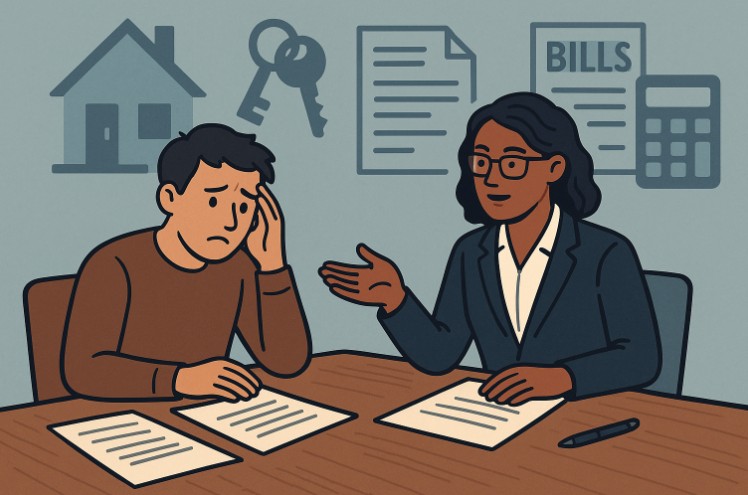Access to legal advice can make the difference between keeping your home or losing it. Legal aid exists to help individuals navigate the complexities of housing and debt issues, especially when they are at risk of eviction, repossession, or severe financial distress.
In this guide, we explore what support is available through legal aid in the UK, who qualifies, and how legal professionals can get involved in the provision of these essential services.
What Is Legal Aid and How Does It Apply to Housing and Debt?
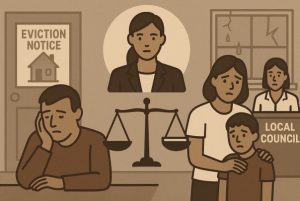
Legal aid is a form of publicly funded legal assistance provided to those who cannot afford to pay for a lawyer. In the UK, civil legal aid covers various issues including housing and debt problems that threaten an individual’s well-being or security of home.
For housing and debt, legal aid can support individuals in the following ways:
- Providing legal advice and representation when facing eviction or repossession
- Assisting with homelessness applications and appeals
- Helping with housing disrepair issues
- Offering guidance for managing serious debt that may lead to legal consequences
- Facilitating early intervention through the Housing Loss Prevention Advice Service
Legal aid in these areas is regulated under the Civil Legal Aid scheme administered by the Legal Aid Agency, and eligibility is determined by a combination of financial criteria and the legal merit of the case.
Who Is Eligible for Legal Aid in Housing and Debt Matters?
Eligibility for legal aid is not automatic. Applicants must meet both financial and legal conditions. The financial test considers income, capital, and household dependents, while the legal test looks at the seriousness of the issue and whether it is reasonable to use public funds for legal assistance.
Certain cases, such as those involving immediate risk of losing a home, may be eligible without going through a full means test, particularly under the Housing Loss Prevention Advice Service.
Legal aid is also available for exceptional cases if a refusal to fund the case would breach human rights or EU law. This is known as Exceptional Case Funding (ECF).
The legal merits test ensures that the case has a reasonable chance of success and that it is proportionate to provide funding. In emergency situations, such as a scheduled eviction hearing, Emergency Representation can be granted immediately and retrospectively approved.
What Types of Housing Issues Are Covered by Legal Aid?
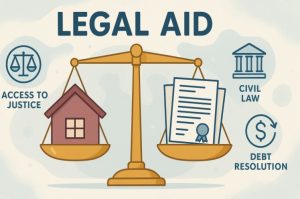
Legal aid funding applies to a wide variety of housing-related legal matters, as identified by the Legal Aid Agency. These include situations where a person is at risk of homelessness, being unlawfully evicted, or where their home is unsafe.
| Housing Case Type | Details |
| Possession and Repossession | Rent arrears, mortgage arrears, or landlord repossession proceedings |
| Homelessness | Application challenges under the Housing Act, interim accommodation issues |
| Housing Disrepair | Unsafe or unhealthy living conditions, failure to repair by the landlord |
| Illegal Eviction | Harassment, forced eviction, lockouts without proper legal process |
| Judicial Review | Claims against public bodies for failure to perform housing duties |
Legal aid is not limited to one-time representation. It may extend through various stages of a housing matter, from initial advice to court representation, particularly if the issue escalates into more serious proceedings.
What Kind of Debt Issues Can You Get Legal Support For?
Legal aid in debt-related matters is designed to assist individuals whose financial obligations have reached a critical stage. Not all types of debt are eligible, but those that may result in homelessness or criminal sanctions typically fall within scope.
Debt issues covered by legal aid include:
- Rent arrears leading to eviction
- Mortgage arrears risking repossession
- Council tax arrears with enforcement actions
- Utility debts that result in disconnection or court involvement
- Debts arising from breach of financial orders where imprisonment is possible
In many of these situations, legal providers can act swiftly, particularly where there is a threat of losing a home or legal enforcement is already in process. Applications for legal aid in criminal-related debt proceedings are also possible if there is a risk of imprisonment, under Section 16 of the Legal Aid, Sentencing and Punishment of Offenders Act 2012.
Which Areas Are Currently Prioritised for Legal Aid Providers?
The Legal Aid Agency has identified several regions across England where legal aid providers are urgently needed to deliver housing, debt, and welfare benefits services. This is part of the Civil 2024 Standard Civil Contract Re-opening initiative.
This ongoing procurement allows providers to submit applications at any time and receive contracts upon passing verification.
| Region | Region |
| Barnsley | Northumberland |
| Calderdale | Rochdale |
| Cheshire | Rotherham |
| City of Kingston upon Hull | Sandwell |
| Doncaster | Trafford |
| East Riding of Yorkshire | Warrington and Halton |
| Hartlepool | West Lancashire |
| Knowsley | Wigan |
| Leicestershire and Rutland | North and North East Lincolnshire |
Providers interested in delivering services in these areas must be able to demonstrate competency in relevant case types and compliance with the LAA’s Supervisor Standards.
What Is the Housing Loss Prevention Advice Service (HLPAS)?
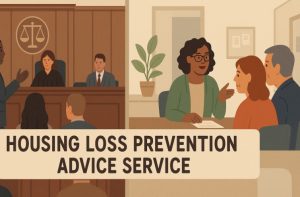
The Housing Loss Prevention Advice Service (HLPAS) is a government-funded legal support scheme introduced to ensure that individuals at risk of losing their homes receive timely legal assistance.
It is designed to provide early intervention, helping individuals understand their rights and options before a housing issue escalates to the point of homelessness or possession proceedings.
HLPAS is operated under the broader framework of civil legal aid and is managed by the Legal Aid Agency (LAA). It replaces the former Housing Possession Court Duty Scheme (HPCDS) and expands the scope of support to include earlier access to legal advice, rather than just on-the-day court representation.
Key Components of HLPAS
HLPAS consists of two core service elements:
1. Early Legal Advice
This part of the service allows individuals to receive legal advice as soon as there are signs that they might lose their home. Legal aid providers can open a legal help matter for clients facing threats such as:
- Receiving a notice seeking possession from a landlord
- Being served with a notice to quit or a formal eviction notice
- Accruing serious rent or mortgage arrears
- Experiencing harassment or informal eviction attempts
This early stage support is critical in helping people respond before court proceedings begin. Advice may include negotiating with landlords, understanding tenancy rights, preparing for possible court actions, or accessing emergency housing.
Under HLPAS, Early Legal Advice can be offered:
- Without the need for a full financial means assessment
- In person or remotely (via phone or video call)
- To individuals who can provide evidence of risk of eviction or loss of home
Examples of qualifying evidence include letters from landlords, formal court notices, tenancy agreements, or documentation of illegal eviction.
2. In-Court Duty Scheme
The In-Court Duty Scheme provides immediate legal advice and representation to individuals attending possession hearings. These are court sessions where landlords, mortgage lenders, or local authorities seek orders to evict or repossess a property.
Key characteristics of the in-court duty support include:
- On-the-day advice and advocacy: Legal advisers meet clients at the court (or remotely, where applicable) and provide representation during the hearing.
- No prior arrangement required: Individuals do not need to have scheduled an appointment in advance to access help.
- Financial eligibility is not assessed: All individuals facing listed possession hearings can access this service, regardless of income.
This urgent support can often lead to adjournments, negotiated settlements, or alternative arrangements that allow the individual to remain in their home.
Structure and Delivery of HLPAS
To provide HLPAS services, legal providers must hold a specific HLPAS Schedule, issued by the LAA. This schedule identifies the court(s) at which the provider must deliver services and sets out the number of Matter Starts allocated for early legal advice.
Providers are expected to:
- Ensure the presence of qualified legal supervisors and authorised litigators
- Maintain coordination with court listings to provide consistent coverage
- Offer follow-up advice or refer clients to other services if further representation is needed
The HLPAS contract is only awarded to firms who can demonstrate capacity, legal expertise, and infrastructure to deliver this service reliably. Some providers may deliver both early advice and in-court support, while others may specialise in one element.
Payment and Claim Process
Legal aid providers are paid under a standard fee model:
- Stage 1 Payment for Early Legal Advice
- Stage 2 Payment for In-Court Duty Scheme services
Where both stages are delivered for a single client, providers may claim both fees, provided the service criteria are met. Payment is processed monthly in arrears, and claims must be supported by evidence and monitoring data submitted to the LAA.
Importance of HLPAS in Preventing Homelessness
HLPAS addresses a significant gap in the previous legal aid system, where individuals often sought legal support too late—sometimes on the day of their court hearing. By allowing access to legal advice earlier in the process, clients are better equipped to:
- Resolve disputes with landlords before court action begins
- Understand and assert their legal rights
- Secure alternative housing options
- Access emergency legal representation if proceedings continue
This service also helps reduce the burden on the courts by encouraging resolution before litigation and ensuring that only cases with valid legal grounds proceed to judgment.
HLPAS reflects the government’s broader commitment to access to justice and housing stability, particularly for vulnerable populations. By intervening early and offering timely advocacy, it plays a pivotal role in reducing evictions, preventing homelessness, and promoting fair treatment for tenants and homeowners.
What Are the Requirements for Legal Aid Supervisors?
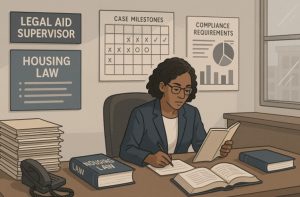
Legal aid providers delivering services in housing and debt are required by the Legal Aid Agency (LAA) to appoint a qualified Supervisor. This is a key compliance requirement under the 2024 Standard Civil Contract.
The Supervisor must ensure that all legal work carried out under the contract meets the necessary quality, ethical, and procedural standards.
A Supervisor is not merely a team lead but a legally experienced practitioner responsible for the oversight, guidance, and quality assurance of legal aid work carried out by their team. The role is vital in maintaining consistency, legal accuracy, and adherence to contractual obligations.
Case Experience Requirements
To be recognised as a Supervisor under the contract, an individual must have recent, relevant experience handling housing and debt cases. The Legal Aid Agency defines this experience through minimum case file requirements, which must be met within the 12 months prior to appointment and maintained throughout the duration of the contract.
Below is a summary of the required experience:
| Housing and Debt Case Category | Minimum Number of Case Files (Past 12 Months) |
| Possession or Repossession | 3 files (e.g., rent arrears, mortgage arrears, or other possession matters) |
| Homelessness | 3 case files |
| Disrepair | 1 case file involving disrepair litigation |
In addition to these:
- Supervisors must have handled 3 housing cases that involved representation (e.g., advocacy in court or tribunal).
- At least 1 case must demonstrate the ability to identify or engage in Judicial Review proceedings, including understanding the client’s role, legal threshold, and procedural requirements.
These requirements ensure that the Supervisor has current and practical knowledge of the legal complexities and client needs in this area of law.
Maintaining a Case Portfolio
The Supervisor is required to maintain a portfolio of cases that document compliance with these experience thresholds. This portfolio must include:
- Client reference numbers
- Case summaries
- Legal issues addressed
- Case outcomes
The LAA may request this portfolio for audit or verification purposes, both at the time of initial Supervisor approval and during contract compliance checks.
Knowledge and Resource Standards
In addition to practical experience, Supervisors must demonstrate access to and knowledge of current legal materials and resources relevant to housing and debt. This includes the following:
- A subscription to at least one nationally published journal focusing on housing law (for example, Legal Action Group or HLPA publications)
- Access to an updated housing law encyclopaedia
- A current edition of the Child Poverty Action Group Debt Handbook
- Access to updated specialist housing law reports
- A copy of the latest Civil Procedure Rules, including any practice directions and supplements
This ensures that Supervisors remain informed about ongoing developments in case law, legislation, and procedural updates that may affect their clients and practice.
Continuous Professional Development and Currency of Knowledge
Where a Supervisor has not recently conducted specific types of housing or debt cases, they must show how they have maintained their legal knowledge in those areas. For example:
- If a Supervisor has not handled a mortgage arrears possession case in the last 12 months, they must demonstrate how they have kept their understanding up to date (e.g., through training, research, or shadowing colleagues).
- If they haven’t worked on a disrepair litigation case, they must be able to explain how they’ve kept pace with relevant protocols and litigation procedures.
Maintaining current knowledge is a contractual requirement and forms part of the overall quality assurance expected by the LAA.
Supervisor Obligations Within the Organisation
The Supervisor must be actively involved in overseeing the delivery of legal aid services. This includes:
- Providing supervision to other fee earners
- Ensuring compliance with contract requirements, especially around Matter Start usage and eligibility
- Reviewing files and offering feedback to junior or less experienced staff
- Supporting quality assurance processes within the firm, including file reviews and outcome monitoring
The Supervisor must also be accessible to support advisers and ensure that their legal decisions are properly guided by current practice and policy.
Where a legal provider offers services under multiple Categories of Law (such as Housing, Debt, and Welfare Benefits), an individual may act as Supervisor across more than one category, provided they meet the criteria for each.
How Do Legal Aid Matter Starts Work in Housing and Debt Cases?
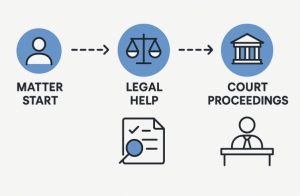
Matter Starts are units of legal aid authorisation that allow providers to begin work on a client’s case. Each Matter Start must correspond to a specific legal issue and be documented according to Legal Aid Agency regulations.
For housing and debt, Matter Starts are used in a variety of scenarios:
- Initial investigation and legal help for housing issues
- Representation at court for possession or eviction proceedings
- Appeals and judicial review processes
Certain rules apply when determining whether a new Matter Start is justified. For instance:
- If a homelessness review leads to a negative decision by a local authority, it may trigger a new Matter Start
- If a possession hearing results in a remittal to the council for reconsideration, the existing Matter Start may continue
- For interim accommodation appeals, a new Matter Start is generally not justified
Providers must retain evidence of the client’s legal issue, such as a notice to quit, court letters, or communication with landlords. In cases of illegal eviction, photo or video documentation may also be required.
Matter Starts must align with funding regulations and cannot be duplicated unnecessarily. Providers may claim payment for both HLPAS work and separate legal aid Matter Starts when dealing with the same client, under specific contractual conditions.
How Can Legal Aid Help Prevent Homelessness in the UK?
Legal aid services play a central role in preventing homelessness by intervening early in disputes and supporting clients through appeals and enforcement actions. When delivered effectively, legal aid can stop unlawful evictions, delay possession to allow for debt management, or force compliance by local councils.
This is achieved through several means:
- Advising clients on their rights and housing options
- Negotiating repayment arrangements with landlords
- Challenging unlawful eviction tactics in court
- Appealing council decisions on homelessness applications
- Securing emergency accommodation through legal remedies
The Housing Act 1996 provides the framework for homelessness decisions, but local authorities often fail to comply or act in time. Legal aid ensures those affected have the ability to respond quickly and assert their legal protections.
Conclusion
Legal aid remains a critical lifeline for individuals facing housing and debt challenges across the UK. By providing access to legal advice, representation, and early intervention, it helps prevent homelessness, resolves disputes, and ensures fair treatment under the law.
With new opportunities for providers and continued support from the government, legal aid plays a vital role in upholding access to justice. Understanding what support is available can make all the difference for those in urgent need of protection and advocacy.
Frequently Asked Questions
What is the difference between Legal Help and Licensed Work?
Legal Help is for initial advice and assistance, whereas Licensed Work covers more complex cases including court representation and higher costs.
Can tenants in private housing get legal aid?
Yes, if they meet the eligibility criteria and the issue falls within scope—such as eviction, disrepair, or illegal eviction.
Is legal aid available for mortgage arrears?
Yes, particularly when the arrears risk leading to repossession or court action.
Do legal aid providers need to have a physical office in priority areas?
Not necessarily, but they must be authorised to deliver services in the specified regions and courts.
What happens if the local authority fails to comply with housing duties?
Legal aid can be used to initiate legal action or enforce compliance, often through judicial review or emergency measures.
Are there limits on how many cases a provider can take?
Yes, providers are allocated a specific number of Matter Starts and must report their usage and outcomes to the LAA.
Can I get legal aid even if I have some income or savings?
Possibly. Eligibility depends on income thresholds, disposable capital, and specific case circumstances. Some urgent cases may bypass the means test.

